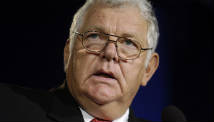Now that he's away from the pool, Michael Phelps can reflect — really reflect — on what he accomplished.
Pretty amazing stuff.
"It's kind of nuts to think about everything I've gone through," Phelps said. "I've finally had time to myself, to sit back and say, '... that really happened?' It's kind of shocking at times."
Not that his career needed a capper, but Phelps added one more honor to his staggering list of accomplishments Thursday — The Associated Press male athlete of the year.
Phelps edged out LeBron James to win the award for the second time, not only a fitting payoff for another brilliant Olympics (four gold medals and two silvers in swimming at the London Games) but recognition for one of the greatest careers in any sport.
Phelps finished with 40 votes in balloting by U.S. editors and broadcasters, while James was next with 37. Track star Usain Bolt, who won three gold medals in London, was third with 23.
Carl Lewis is the only other Olympic-related star to be named AP male athlete of the year more than once, taking the award for his track and field exploits in 1983 and '84. The only men honored more than twice are golf's Tiger Woods and cyclist Lance Armstrong (four times each), and basketball's Michael Jordan (three times).
"Obviously, it's a big accomplishment," Phelps said. "There's so many amazing male athletes all over the world and all over our country. To be able to win this is something that just sort of tops off my career."
Phelps retired at age 27 as soon as he finished his final race in London, having won more gold medals (18) and overall medals (22) than any other Olympian.
No one else is even close.
"That's what I wanted to do," Phelps said. "Now that it's over, it's something I can look back on and say, 'That was a pretty amazing ride.'"
The current ride isn't so bad either.
Set for life financially, he has turned his fierce competitive drive to golf, working on his links game with renowned coach Hank Haney as part of a television series on the Golf Channel. In fact, after being informed of winning the AP award, Phelps called in from the famed El Dorado Golf & Beach Club in Los Cabos, Mexico, where he was heading out with Haney to play a few more holes before nightfall.
"I can't really complain," Phelps quipped over the phone.
Certainly, he has no complaints about his swimming career, which helped turn a sport that most Americans only paid attention to every four years into more of a mainstream pursuit.
More kids took up swimming. More advertisers jumped on board. More viewers tuned in to watch.
While swimming is unlikely to ever match the appeal of football or baseball, it has carved out a nice little niche for itself amid all the other athletic options in the United States — largely due to Phelps' amazing accomplishments and aw-shucks appeal.
Just the fact that he won over James shows just how much pull Phelps still has. James had an amazing year by any measure: The league MVP won his first NBA title with the Miami Heat, picking up finals MVP honors along the way, and then starred on the gold medal-winning U.S. basketball team in London.
Phelps already had won the AP award in 2008 after his eight gold medals in Beijing, which broke Mark Spitz's record. Phelps got it again with a performance that didn't quite match up to the Great Haul of China, but was amazing in its own right.
After the embarrassment of being photographed taking a hit from a marijuana pipe and questioning whether he still had the desire to go on, Phelps returned with a vengeance as the London Games approached. Never mind that he was already the winningest Olympian ever. Never mind that he could've eclipsed the record for overall medals just by swimming on the relays.
He wanted to be one of those rare athletes who went out on top.
"That's just who he is," said Bob Bowman, his longtime coach. "He just couldn't live with himself if knew he didn't go out there and give it good shot and really know he's competitive. He doesn't know anything else but to give that kind of effort and have those kind of expectations."
Phelps got off to a rocky start in London, finishing fourth in the 400-meter individual medley, blown out of the water by his friend and rival, Ryan Lochte. It was only the second time that Phelps had not at least finished in the top three of an Olympic race, the first coming way back in 2000 when he was fifth in his only event of the Sydney Games as a 15-year-old.
To everyone looking in, Lochte seemed poised to become the new Phelps — while the real Phelps appeared all washed up.
But he wasn't going out like that.
No way.
Phelps rebounded to become the biggest star at the pool, edging Lochte in the 200 IM, contributing to a pair of relay victories, and winning his final individual race, the 100 butterfly. There were two silvers, as well, leaving Phelps with a staggering resume that will be awfully difficult for anyone to eclipse.
His 18 golds are twice as many as anyone else in Olympic history. His 22 medals are four clear of Larisa Latynina, a Soviet-era gymnast, and seven more than the next athlete on the list. Heck, if Phelps was a nation, he'd be 58th in the medal standings, just one behind India (population: 1.2 billion).
"When I'm flying all over the place, I write a lot in my journal," Phelps said. "I kind of relive all the memories, all the moments I had throughout my career. That's pretty special. I've never done that before. It's amazing when you see it all on paper."
Four months into retirement, Phelps has no desire to get back in the pool. Oh, he'll swim every now and then for relaxation, using the water to unwind rather than putting in one of his famously grueling practices. Golf is his passion at the moment, but he's also found time to cheer on his hometown NFL team, the Baltimore Ravens, and start looking around for a racehorse that he and Bowman can buy together.
Phelps hasn't turned his back on swimming, either. He's got his name attached to a line of schools that he wants to take worldwide. He's also devoting more time to his foundation, which is dedicated to teaching kids to swim and funding programs that will grow the sport even more.
He's already done so much.
"His contribution to the way the world thinks about swimming is so powerful," Bowman said. "I don't think any other athlete has transformed his sport the way he's transformed swimming."
Phelps still receives regular texts from old friends and teammates, asking when he's going to give up on this retirement thing and come back the pool as a competitor.
He scoffs at the notion, sounding more sure of himself now than he did in London.
And if there's anything we've learned: Don't doubt Michael Phelps when he sets his mind on something.
"Sure, I could come back in another four years. But why?" he asked, not waiting for an answer. "I've done everything I wanted to do. There's no point in coming back."
___
Follow Paul Newberry on Twitter at www.twitter.com/pnewberry1963


